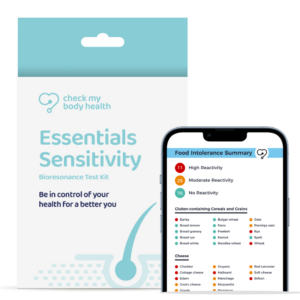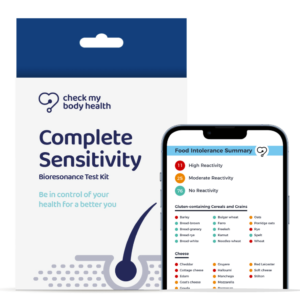Low-FODMAP Diet Guide

Medically reviewed by Sian Baker, Dip ION mBANT mCNHC
on April 02, 2023. To give you technically accurate, evidence-based information, content published on the Check My Body Health blog is reviewed by credentialed professionals with expertise in medical and bioscience fields.

What is FODMAP?
FODMAP stands for Fermentable Oligosaccharides, Disaccharides, Monosaccharides, and Polyols. These are types of carbohydrates that can be poorly absorbed in the small intestine and can cause symptoms such as bloating, gas, abdominal pain and diarrhoea in some people.
The FODMAPs include:
- Oligosaccharides: fructans and galacto-oligosaccharides (found in wheat, onions, garlic, etc.)
- Disaccharides: lactose (found in milk and dairy products)
- Monosaccharides: excess fructose (found in fruits, honey, high fructose corn syrup)
- Polyols: sugar alcohols (such as sorbitol, mannitol, xylitol, and maltitol found in some fruits, vegetables, and sugar-free products)
A low FODMAP diet is a dietary approach that aims to reduce the intake of these carbohydrates to alleviate symptoms in people with Irritable Bowel Syndrome (IBS) and other functional gastrointestinal disorders. The diet involves eliminating foods high in FODMAPs for a period of time, typically 6 to 8 weeks, and then gradually reintroducing them to determine which foods trigger symptoms.
It’s important to note that a low FODMAP diet is a temporary diet and should only be followed under the guidance of a qualified healthcare professional such as a dietitian, as it can be restrictive and may lead to nutrient deficiencies if not followed correctly.
What is a Low-FODMAP Diet
A low-FODMAP diet is a dietary plan that helps individuals manage symptoms of irritable bowel syndrome (IBS) by limiting certain types of carbohydrates that can be difficult to digest. FODMAP stands for “fermentable oligosaccharides, disaccharides, monosaccharides, and polyols,” which are types of sugars and fibres found in many foods. By avoiding high-FODMAP foods, individuals on the diet can reduce symptoms such as gas, bloating, and abdominal pain. The diet is typically implemented under the guidance of a registered dietitian or healthcare provider.
What Foods Can You Eat on a FODMAP diet
On a low-FODMAP diet, individuals typically eat a variety of foods that are low in FODMAPs. These include:
Fruits: Berries, citrus fruits (such as oranges and lemons), kiwi, pineapple, and ripe bananas are typically well-tolerated.
Vegetables: Leafy greens, bell peppers, carrots, eggplant, squash, and sweet potatoes are usually okay.
Meat, Fish, and Poultry: Fresh, unprocessed meats, fish and poultry are allowed on the diet.
Dairy Alternatives: Lactose-free milk and other dairy alternatives such as soy, almond, and rice milk are usually okay.
Gluten-free grains: Rice, quinoa, and corn are allowed on the diet.
Nuts and seeds: Almonds, macadamia nuts, and sunflower seeds are usually well-tolerated.
It’s important to note that the diet is not a permanent one and is usually done under the guidance of a registered dietitian or healthcare provider. After a period of time, the person will be slowly re-introduced to certain foods to check for any symptoms.
When is Low-FODMAP not recommended
A low-FODMAP diet is typically recommended for individuals with irritable bowel syndrome (IBS) who have not found relief with other dietary or lifestyle changes. However, it is not recommended for everyone and there are certain situations where it should be avoided.
Pregnant women: A low-FODMAP diet may not provide enough nutrients for a growing baby, so it should be avoided during pregnancy.
Children: Children’s nutritional needs are different from adults, and a low-FODMAP diet may not provide enough energy and nutrients for growth and development.
Individuals with a history of eating disorders: A low-FODMAP diet may be restrictive and could trigger disordered eating.
Individuals with certain digestive disorders: Before starting a low-FODMAP diet, it’s essential to have ruled out coeliac disease and inflammatory bowel disease as the diet may not be appropriate for these digestive disorders.
It is also important to note that the diet should not be followed without guidance of a registered dietitian or healthcare provider, as it can cause certain nutrient deficiencies if not done properly.
What are the benefits of a Low-FODMAP Diet
A low-FODMAP diet can be beneficial for individuals with irritable bowel syndrome (IBS) as it can help reduce symptoms such as:
- Abdominal pain and discomfort
- Bloating
- Gas
- Constipation or diarrhoea
By avoiding high-FODMAP foods, the diet can help reduce the amount of gas and fluid in the gut, which can lead to less bloating and pain. The diet may also help improve gut motility, which can help alleviate constipation or diarrhoea.
It’s also important to note that a low-FODMAP diet is not a permanent diet, and individuals should work with a registered dietitian or healthcare provider to gradually re-introduce FODMAPs back into their diet. This way, they can identify their personal triggers, whilst enjoying those FODMAP foods which do not provoke symptoms and create a sustainable, long-term dietary plan that works for them. This can help improve the overall quality of life and reduce the frequency of IBS symptoms.
Can a low-FODMAP diet help mental health
There is some evidence to suggest that a low-FODMAP diet may help improve mental health in individuals with IBS. This is because IBS symptoms can significantly impact a person’s quality of life and can lead to anxiety, depression and even social isolation. By reducing symptoms such as abdominal pain, bloating, and gas, the low-FODMAP diet can improve an individual’s overall well-being, which can have a positive impact on their mental health.
Additionally, by identifying specific FODMAPs that trigger IBS symptoms, individuals can create a personalised dietary plan that works for them, which can help them feel more in control of their condition, which in turn can have a positive impact on their mental health.
However, it’s important to note that a low-FODMAP diet should not be used as a sole treatment for mental health issues, and individuals with mental health concerns should consult with a mental health professional for proper diagnosis and treatment.
References
- “Low-Fodmap Diet.” American College of Gastroenterology, 31 Jan. 2022. Accessed 16 January 2023. (https://gi.org/topics/low-fodmap-diet/)
- “Try a Fodmaps Diet to Manage Irritable Bowel Syndrome.” Harvard Health, 17 Sept. 2019. Accessed 16 January 2023. (https://www.health.harvard.edu/diet-and-weight-loss/a-new-diet-to-manage-irritable-bowel-syndrome)
- Veloso, Hazel Galon. “FODMAP Diet: What You Need to Know.” Johns Hopkins Medicine. Accessed 16 January 2023. (https://www.hopkinsmedicine.org/health/wellness-and-prevention/fodmap-diet-what-you-need-to-know)
- Nanayakkara, Wathsala S, et al. “Efficacy of the Low Fodmap Diet for Treating Irritable Bowel Syndrome: The Evidence to Date.” Clinical and Experimental Gastroenterology, Dove Medical Press, 17 June 2016. Accessed 16 January 2023. (https://www.ncbi.nlm.nih.gov/pmc/articles/PMC4918736/)
- Fadgyas-Stanculete, Mihaela, et al. “The Relationship between Irritable Bowel Syndrome and Psychiatric Disorders: From Molecular Changes to Clinical Manifestations.” Journal of Molecular Psychiatry, BioMed Central, 27 June 2014. Accessed 16 January 2023. (https://www.ncbi.nlm.nih.gov/pmc/articles/PMC4223878/)
- Magge, Suma, and Anthony Lembo. “Low-FODMAP Diet for Treatment of Irritable Bowel Syndrome.” Gastroenterology & Hepatology, Millennium Medical Publishing, Nov. 2012. Accessed 16 January 2023. (https://www.ncbi.nlm.nih.gov/pmc/articles/PMC3966170/)



